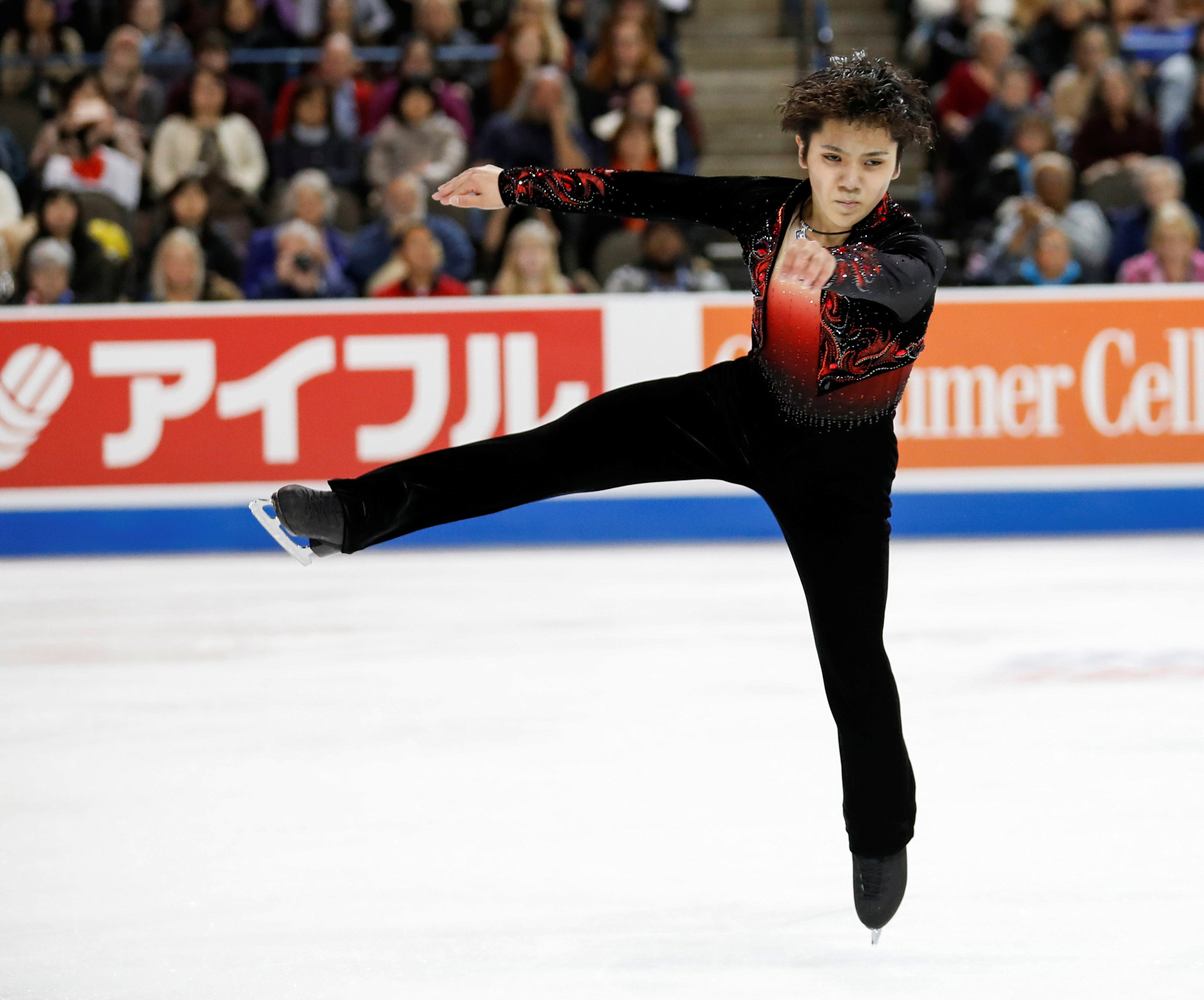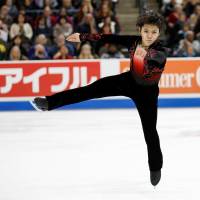They say that good things come in small packages.
Never has that been more true than in the case of 159-cm Shoma Uno.
The 18-year-old scored a decisive victory in the season-opening Grand Prix at Skate America on Sunday. Even more impressive than the win, was the way he achieved it — with poise and polish that belied his young age.
Focused and fearless, the Nagoya native landed three beautiful quadruple jumps in his free skate to beat second-place finisher Jason Brown of the United States by more than 10 points. Uno's total score of 279.34 was a personal best.
Though he fell on a triple axel, it was clear that Uno sent a message to the skating world with his performance.
"I was aiming for a perfect program, but it was unfortunate I missed the three-jump combination at the end," Uno told NBC after the free skate. ". . . I am happy that I got the title at this major competition."
Eurosport's Chris Howarth was just one of the analysts raving about Uno's showing at Skate America.
"He is a phenomenon," Howarth stated after Uno's fantastic free skate. "He is incredible."
In addition to the three quads, Uno executed a beautiful triple axel/triple toe loop combo from a spread eagle during the middle of the program.
He may have actually saved his best move for late, a sublime cantilever that had the audience roaring.
"That was amazing, wasn't it? Right at the end of the program," said Howarth, of one of the most difficult maneuvers in the sport.
"Only certain skaters in the world can perform that move," added Howarth's partner Nicky Slater.
"He was seventh in the world last year," Howarth noted. "I can't imagine him being seventh at worlds again. He is very much fancied for the podium this year."
Mai Mihara, a 17-year-old from Kobe, earned the bronze medal in her first senior Grand Prix behind Americans Ashley Wagner and runner-up Mariah Bell. It was a fine debut for Mihara, who won the Nebelhorn Trophy last month.
Mihara also made a positive impression on some of the experts at Skate America.
CBC announcer Carol Lane, who is one of the best analysts in the business, referred to the step sequence in Mihara's free skate as "absolutely lovely."
"She is one of those skaters who just bring the joy with her, isn't she?" Lane commented. "So light on her feet. Just effortless across the ice."
Mihara's second GP assignment will be at the Cup of China in Beijing next month.
The outlook for three-time world champion Mao Asada is not so bright. Mao struggled to a sixth-place finish, meaning any chance at qualifying for the Grand Prix Final is out the window.
Mao, who won her first GP assignment last season (Cup of China), posted the poor result without attempting a triple axel in either the short program or free skate. The decision has been attributed to pain in her left knee, but she claimed after the short program that her knee was "OK."
With multiple errors in her free skate, Mao really needs to assess where she is at and where she is going. She was only able to land two clean triples (a flip and a loop). This is something that in recent years would have been incomprehensible.
A great many skating fans in Japan and around the world maintain the hope that Mao can regain her past glory and win the gold medal at the 2018 Pyeongchang Olympics.
The bigger question at this point is whether Mao will even be on the Japan team.
It's not unthinkable, especially with the likes of Satoko Miyahara, Wakaba Higuchi, Marin Honda, Kaori Sakamoto and Yuna Shiraiwa all certain to be in the mix for the three prized spots.
"It's early in the season," said Howarth, in a hopeful tone, after Mao's calamitous free skate. "That's the plus."
Mao said before the event started that she would try the triple axel later in the season "if I'm ready."
Perhaps the most interesting comment at Skate America came at practice last Thursday, when Mao spoke in English with The Skating Lesson's David Lease.
"Do you still love to skate as much as you do when you were young?" Lease asked Mao.
"When I was young I was so happy and liked skating," Mao replied after pondering the question. "But now it's a little bit difficult. But I like skating."
Very interesting.
Passion for Takahashi: Last week Ice Time documented how a skating fan from Romania (Ioana) had chronicled the top 10 competitive programs (in her view) of Daisuke Takahashi's career on her website Use Your Illusion (iguana012.tumblr.com).
Takahashi fans who read the column were clearly enthusiastic about Ioana's efforts, so I asked the 25-year-old some questions about how she came to be a fan of the 2010 world champion.
Here are Ice Time's questions and Ioana's responses.
How long have you been a fan of Takahashi?
"Ever since I saw his Hip-Hop Swan Lake short program in 2007."
What is it about his skating that moves you most?
"His ability to express the music, any kind of music, with his body."
Is he your all-time favorite skater? If not, who is?
"Yes he is."
Why do you think he has retained his popularity even after retiring?
"He's had a long career and he competed at three Olympics. He was the first (male) Japanese Olympic medalist as well as world champion. Apart from paving the way for younger skaters in his country, his talent appealed to a wide variety of people, he had star quality and endearing personality."
You are a fan of Japanese skaters? Why is that?
"Yes, because I believe they all possess unique qualities, even though some are not as 'decorated' as others."
Her are some examples she cited of her admiration:
"Midori Ito, a legend whose triple axel put some of the men's to shame."
"Yuka Sato's delightful skating skills."
" 'Cool beauty' Shizuka Arakawa's elegance and signature layback Ina Bauer."
"The first Japanese skater to land a quadruple jump in competition — Takeshi Honda."
"Prima ballerina legend Mao Asada, who will probably remain the biggest name in Japanese figure skating for a long time."
"The first woman to land a quadruple jump in competition Miki Ando."
" 'The king' (Daisuke Takahashi) and 'the prince' (Yuzuru Hanyu), who has been leading worldwide men's skating for almost three years."
"The joyful late bloomer Akiko Suzuki who I believe was the equivalent of Takahashi in ladies with her ability to perform and express her love for skating."
"Tatsuki 'the ice philosopher' Machida, 0.33 points away from becoming the second (men's) Japanese world champion in 2014 and currently known for his unique balletic skating style and choreography."
"Satoko Miyahara, a strong example of consistency and hard work, as well as effortless multi-directional skating, fine understanding of music phrasing and the only skater currently spinning in both directions."
"Shoma Uno, the first skater to land a quadruple flip in competition, also known for his musicality and speed across the ice."
If you could compare Takahashi to an artist or performer (living or not) in another field, who would it be?
"It's impossible to compare him to anyone, there's only one Takahashi."
Have you ever met Takahashi?
"No, and I have never seen him skate live."
Ioana's answers illustrate her great appreciation for Takahashi and Japanese skaters. The fact that she never even saw the 2010 Olympic bronze medalist compete live conveys the magnetism that Takahashi produced from afar.
Up next: The GP circuit moves to Mississauga, Ontario, for Skate Canada this week. Olympic champion Yuzuru Hanyu and Takahito Mura will represent Japan in men's singles, while Miyahara, Rika Hongo and Yuka Nagai will take the ice in the women's competition.
Hanyu's primary challenge should come from three-time world champion Patrick Chan.
Japan's female trio will be going up against defending world champion Evgenia Medvedeva of Russia.


















With your current subscription plan you can comment on stories. However, before writing your first comment, please create a display name in the Profile section of your subscriber account page.